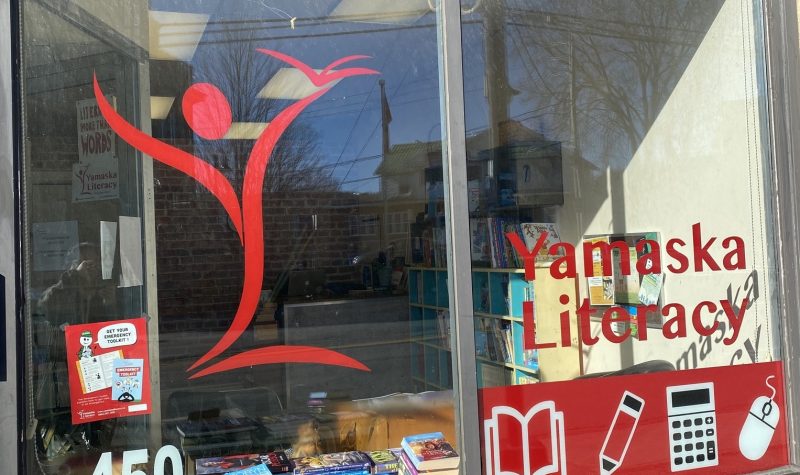Since 1981, English-speaking adults (16+) facing literary challenges that live in either Brome-Missisquoi or Haut-Yamaska have been supported by the Yamaska Literacy Council (YLC).
Through its different programs and services, which include one-to-one tutoring, lifelong learning, youth and family initiatives, and promotion, outreach and advocacy, the YLC has a mission to address the literacy needs of both regions and to raise awareness on literacy issues and the possible solutions.
As one of 13 literacy centres in Quebec for English speakers, the YLC is pillar for those seeking to improve their literary skills. Throughout the pandemic for example, the YLC worked with individuals that were struggling with the transition of using more technological means to fulfill their daily tasks.
As we begin a new year, Wendy Seys, executive director of the YLC, looks back on the organization’s biggest accomplishments and challenges over the last year and speaks on some of the projects expected to be launched in 2023.
“Our capstone program has always been our “Each-One-Teach-One” tutoring. (…) In addition to “Each-One-Teach-One” tutoring, we do lifelong learning programs. It’s mostly health literacy, digital literacy, financial literacy, those types of literacies we need every day throughout our life. And we do have Family Literacy Day programs coming up in January,” said Seys.
Seys noted that the organization did a lot of intergenerational work and highlighted the fact that many people had to turn to online technology very quickly whether they wanted to or not.
“One of the groups that was really left behind in that was seniors. As soon as the pandemic started we got calls from seniors that couldn’t go out and get their groceries, how do they order them online, I don’t know how to use my iPad, I’m feeling isolated, how do I talk to my grandchildren online? We got a lot of requests for that,” she mentioned.
As a result, the YLC launched a “Senior’s Digital Literacy Club” this year through a project with New Horizons for Seniors.
“The model that we use is that we train some seniors to be mentors and to peer tutor other seniors. (…) In the morning, we will have a workshop and invite someone to come in and do a presentation on things like how to create a secure password, how to be aware of frauds and scams, how to use Zoom, how to shop online safely. (…) In the afternoon, after everyone has had lunch together, we match people up one-on-one and they practice a skill,” explained Seys.
For the last four years, the YLC has also collaborated with the Brome-Missisquoi Campus adult education centre on a project called "ETSB On the Road" to support adults that are looking to get back into learning.
"We know that many adult learners don't have transportation and not everyone wants to go to Cowansville and sit in the classroom," explained Seys. "Sometimes adults who have not had a positive school experience are afraid to go back into a formal school. So, the idea is to bring the learning and the classes out into the community.”
The organization really wants to have a presence in the community for adult learning of all forms, noted Seys.
"Whether it's working an adult literacy program, whether they're doing distance education, whether it's being enrolled in a class at the campus. There's really a lot of options and the goal was really to let people know what those options are," she emphasized.
Seys explained that like most community organizations, one of the YLC's greatest challenges was changing how it operated throughout the pandemic, leading to a loss of volunteers and learners.
"Our traditional way of operating was face-to-face and that was something that was, really, for many or our learners that have attention issues, or learning difficulties, or reasons why they couldn't participate successfully in a classroom, many of those learners found that the screen was a barrier," said Seys. "(...) Community groups are struggling to find staff, to find volunteers, and to sort of reset their programs in life after Covid."
While looking forward to a fresh start, Seys said that literacy councils are often described as "one of the safety nets when people fall through the cracks of other formal learning or other social services," but that there is still an unawareness that still exists surrounding literacy and the services that are available.
"I think the biggest challenge that remains is that most people think that literacy means you can't read and write, but it's so much more than that. (...) I think the biggest challenge is awareness, a lot of people don't know that a literacy council exists in this area. We always strive to get the message out and to let people know that low literacy affects many of us," she said.
The YLC has already piloted new projects that it hopes to get up and running for this year, including a “Reading Buddies Program” between seniors and children and the “ABC Kitchen” where participants will have the opportunity to practice their literacy skills through cooking.
The “Senior’s Digital Literacy Club” is picking up again this month and the YLC will be celebrating Family Literacy Day on Jan. 27.
For more information on the YLC and its services and programs consult its website, social media platforms, or call at (450) 263-7503.
Listen to the full interview below:


